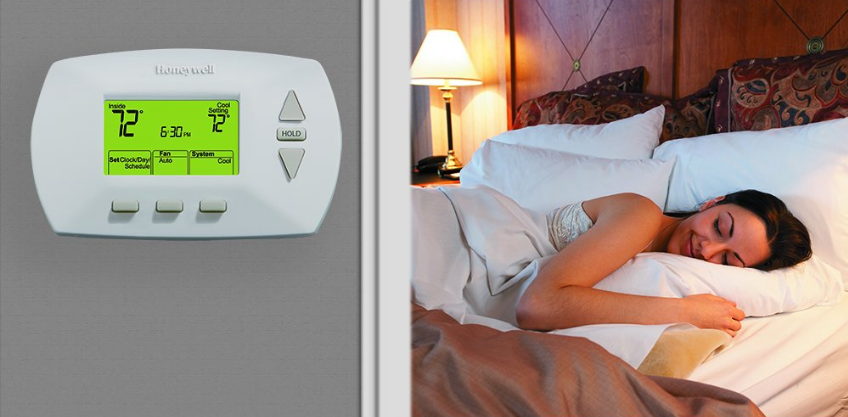
Honeywell RTH6350 5-2 Programmable Thermostat
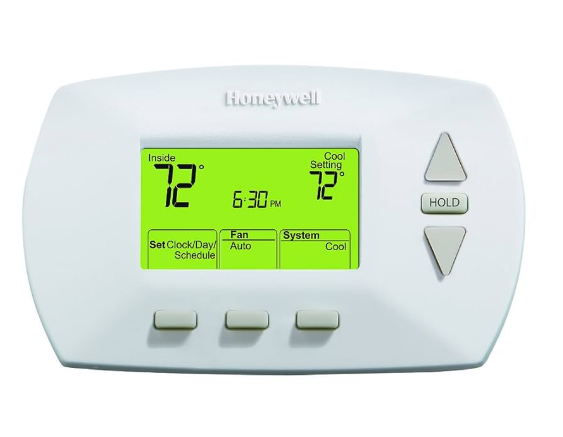
Installation is Easy
- Label wires and remove your old thermostat
- Install and wire your new thermostat
- Set your new thermostat to match your heating/cooling system
Turn Off Power to Heating/Cooling System
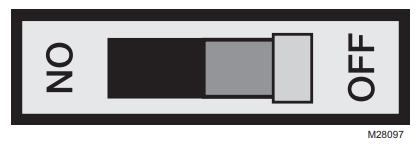
Remove Old Thermostat
Remove the old thermostat, but leave the wallplate with wires attached.
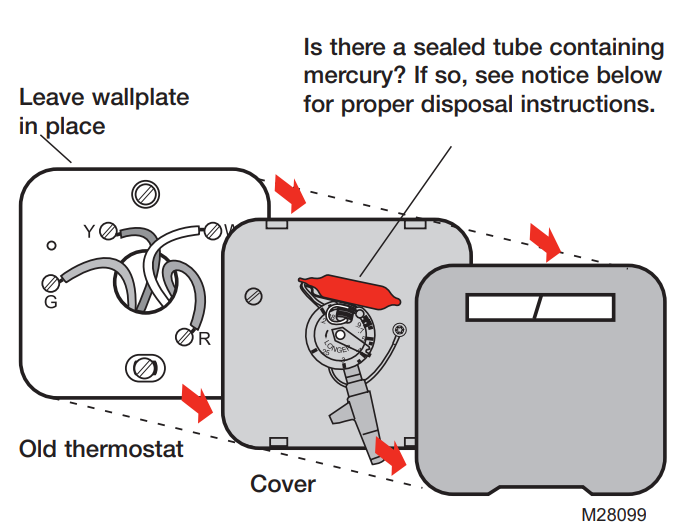
Label Wires with Tags
Label the wires using the supplied wire labels as you disconnect them.
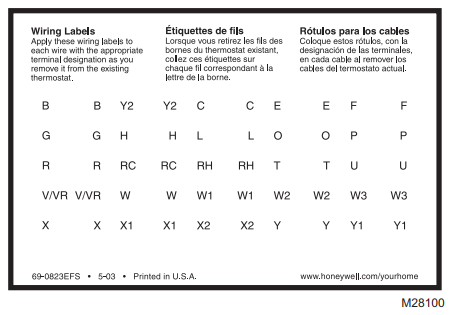
Wire Labels
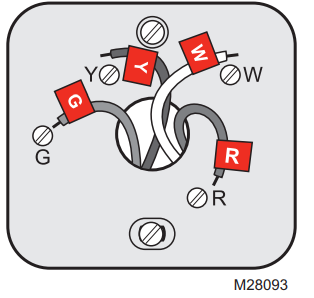
Separate Wallplate from New Thermostat
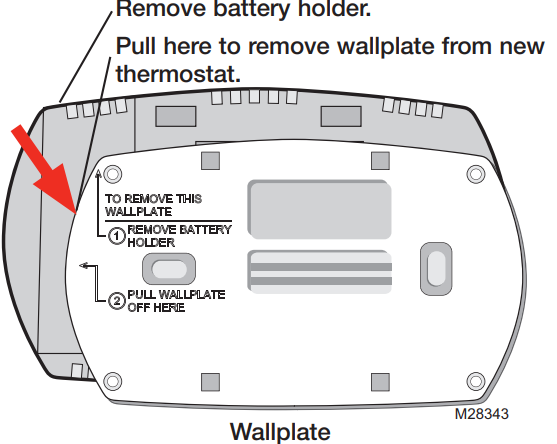
Insert Quick Reference Card
Insert the quick reference card into the slot in the back of the thermostat.
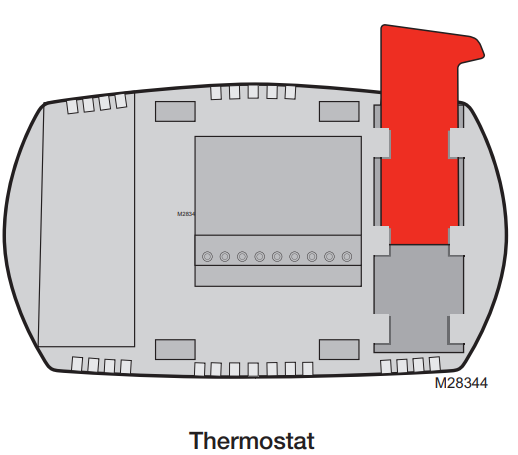
Mount Wallplate
Mount the new wallplate using the included screws and anchors.
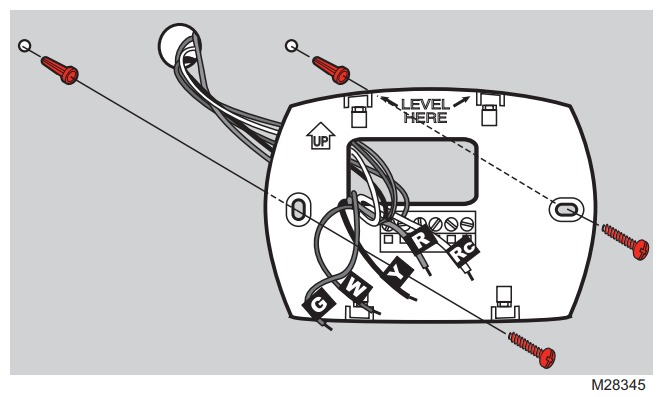
- Drill 3/32-in. holes for plaster.
- Drill 3/16-in. holes for drywall.
- Use a hammer to tap the anchors into the wall.
Connect Wires
Simply match wire labels.
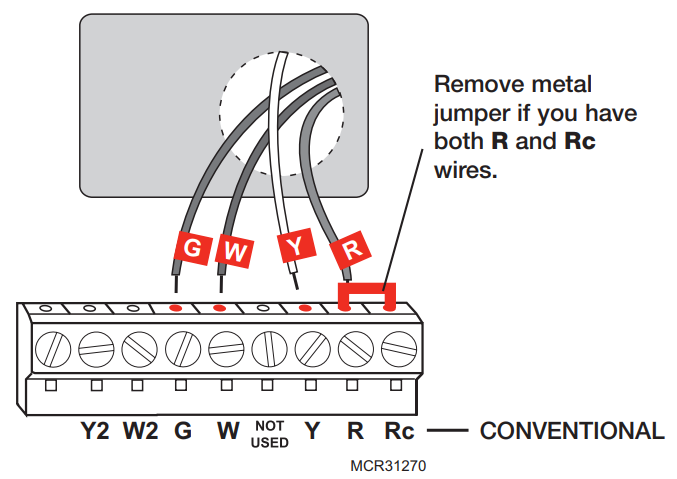
- Labels don’t match? See page 23.
- Have a Heat Pump system? See pages 24-25.
- We are here to help.
- Call 1-800-468-1502 for wiring assistance.
Install Batteries
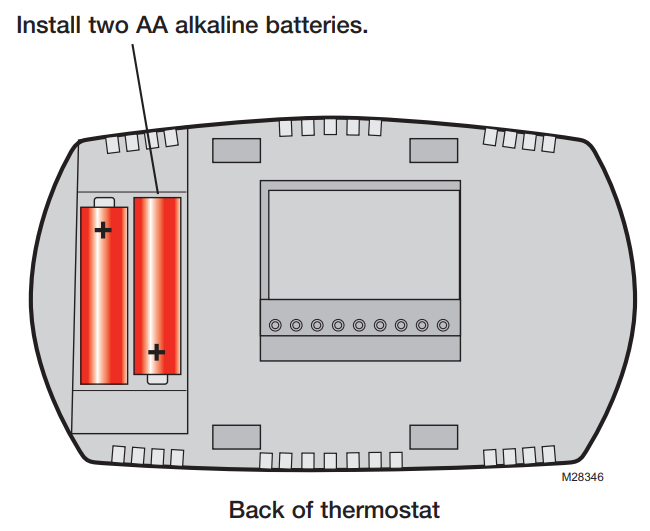
Install Thermostat onto Wallplate
Install the thermostat onto the wallplate on the wall.
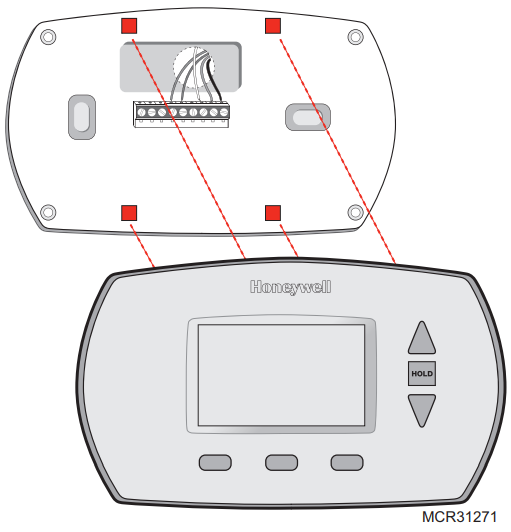
Turn Power Back On
Turn the power back on to the heating/cooling system.
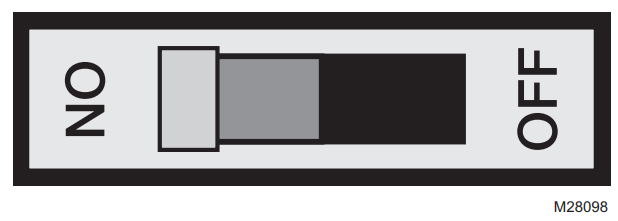
If your system type is…
If your system type is:
- Single Stage Heat and Cool
Congratulations, you’re done!
If your system type is:
- Multistage Heat and Cool
- Heat Pump* without Backup Heat
- Heat Pump* with Backup Heat
- Heat Only
- Cool Only
Continue with advanced installation
on page 13 to match your thermostat to your system type. Heat Pump—an air conditioner that provides cooling in the summer, and also runs in reverse in the winter to provide heating. If you are not sure of your system type or if you have other questions, call us toll-free at 1-800-468-1502. This thermostat works on 24-volt or 750 mV systems. It will NOT work on multi-stage heat pump systems or 120/240 Volt systems.
SYSTEM SETUP
Press and hold the s and FAN buttons until the screen changes (approximately 5 seconds).
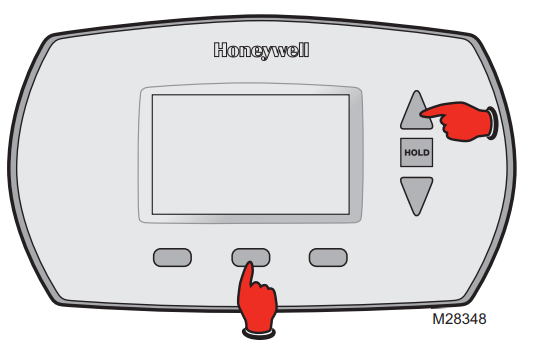
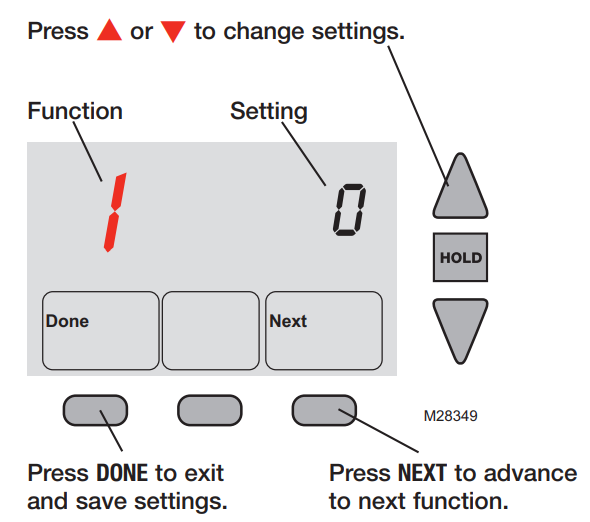
Advanced Installation Guide
Function 1: System type
Press the s or t button to select the type of system you have in your home:
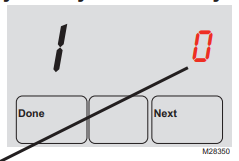
0. Heating & cooling: Gas, oil, or electric heating with central air conditioning.
- Heat pump: Outside compressor provides both heating and cooling without backup or auxiliary heat.
- Heating only: Gas, oil, or electric heating without central air conditioning.
- Heating only with fan: Gas, oil, or electric heating without central air conditioning. (Use this setting if you could turn the fan on and off with a fan switch on your old thermostat.)
- Cool only: Central air conditioning only.
- Heat Pump: Outside compressor provides both heating and cooling with backup or auxiliary heating.
- Heat/Cool Multiple Stages: Two heat stages (wires on W and W2), two cooling stages (wires on Y and Y2).
- Heat/Cool Multiple Stages: Two heat stages (wires on W and W2), one cooling stage (wire on Y).
- Heat/Cool Multiple Stages: One heat stage (wire on W), two cooling stages (wires on Y and Y2).
Function 2: Heat pump changeover valve
Press the s or t button to select whether your changeover valve is used in heating or cooling:

0. Cooling changeover valve: Use this setting if you connected a wire labeled “O” to the O/B wire terminal (see page 21).
- Heating changeover valve: Use this setting if you connected a wire labeled “B” to the O/B wire terminal (see page 21).
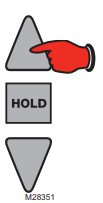
Press to change the setting. When the correct setting is selected, press NEXT to display the next function.
Function 3: Heating fan control
Press the s or t button to select your heating system and fan operation:
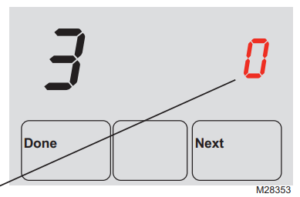
0. Gas or oil heat: Use this setting if you have a gas or oil heating system (system controls fan operation).
- Electric heat: Use this setting if you have an electric heating system (thermostat controls fan operation).
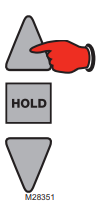
Press to change the setting. When the correct setting is selected, press NEXT to display the next function.
Function 5: Heating cycle rate
Press the UP OR DOWN button to select your heating system and optimize its operation:
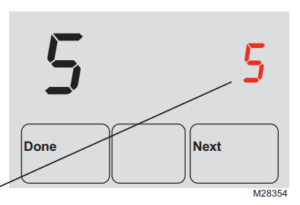
- 5 Gas or oil furnace: Use this setting if you have a standard gas or oil furnace that is less than 90% efficient.
- 9 Electric furnace: Use this setting if you have any type of electric heating system.
- 3 Hot water or high-efficiency furnace: Use this setting if you have a hot water system or a gas furnace of greater than 90% efficiency.
- 1 Gas/oil steam or gravity system: Use this setting if you have a steam or gravity heat system.
Function 6: Stage 2 Heat cycle rate
Press the UP or DOWN button to select your heating system and optimize its operation:
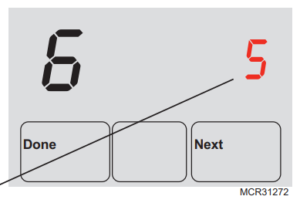
- 5 Gas or oil furnace: Use this setting if you have a standard gas or oil furnace that is less than 90% efficient.
- 9 Electric furnace: Use this setting if you have any type of electric heating system.
- 3 Hot water or high-efficiency furnace: Use this setting if you have a hot water system or a gas furnace of greater than 90% efficiency.
- 1 Gas/oil steam or gravity system: Use this setting if you have a steam or gravity heat system.
Function 8: Emergency heat cycle rate
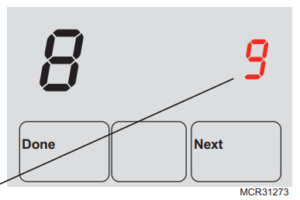
- 9 Electric furnace: Use this setting if you have any type of electric heating system.
- 1 Gas/oil steam or gravity system: Use this setting if you have a steam or gravity heat system.
- 3 Hot water or high-efficiency furnace: Use this setting if you have a hot water system or a gas furnace of greater than 90% efficiency.
- 5 Gas or oil furnace: Use this setting if you have a standard gas or oil furnace that is less than 90% efficient.
Function 12: Manual/Auto Changeover
Press the UP or DOWN button to select Manual or Auto Changeover:

- 0 Manual Changeover: (Heat/Off/Cool)
- 1 Automatic Changeover: (Heat/Off/Cool/Auto) Automatically turns on heat or cool based on room temperatures.
Function 13: Smart Response® Technology
Press the UP or DOWN button to select Smart Response® Technology:
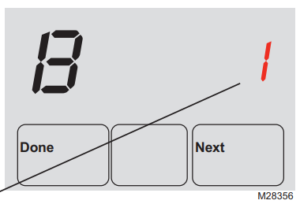
- 1 Smart Response® Technology ON
- 0 Smart Response® Technology OFF
Function 14: Temperature display

- 0 Fahrenheit temperature display (°F)
- 1 Celsius temperature display (°C)
Congratulations, you’re done!
Wiring—Conventional System
If labels do not match letters on the thermostat, check the chart below and connect to the terminal as shown here (see notes below).
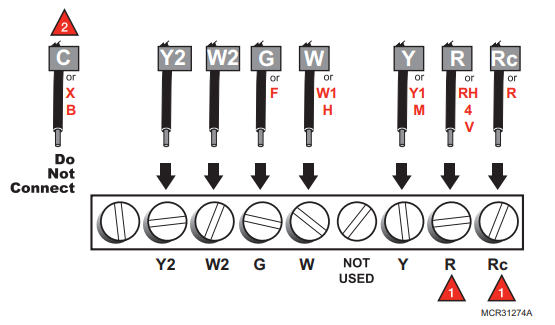
- If wires are connected to both R and Rc terminals, remove the metal jumper (see page 6).
- Do not use C, X, or B. Wrap the bare end of the wire with electrical tape.
WIRING HEAT PUMP
Connect wires: Heat Pump
- Match each labeled wire with the same letter on the new thermostat.
2. Use a screwdriver to loosen screws, insert wires into the hole under the screw, then tighten the screws until the wire is secure. - If E and Aux do not each have a wire connected, use a small piece of wire to connect them.
- Push any excess wire back into the wall opening.
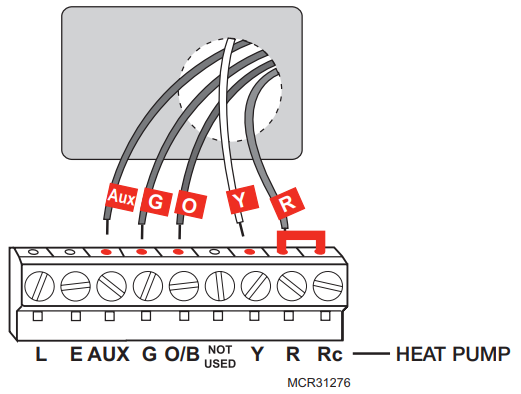
Alternate wiring (for heat pumps only)
If labels do not match letters on the thermostat, check the chart below and connect to the terminal as shown here (see notes below).
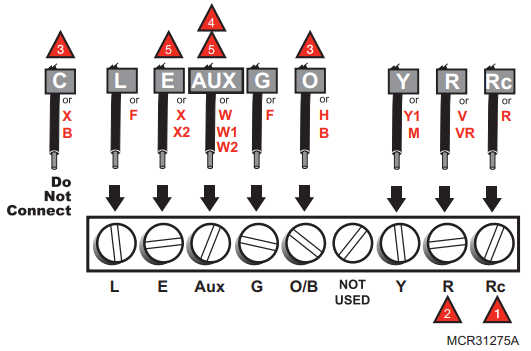
- Leave the metal jumper in place, connecting R & Rc terminals.
- If your old thermostat had both V and VR wires, stop now and contact a qualified contractor for help.
- If your old thermostat had separate O and B wires, wrap the B wire in electrical tape and do not connect.
- If your old thermostat had Y1, W1, and W2 wires, stop now and contact a qualified contractor for help.
- If E and Aux terminals do not each have a wire connected, use a small piece of wire to connect them.
Troubleshooting
If you have difficulty with your thermostat, please try the following suggestions. Most problems can be corrected quickly and easily.
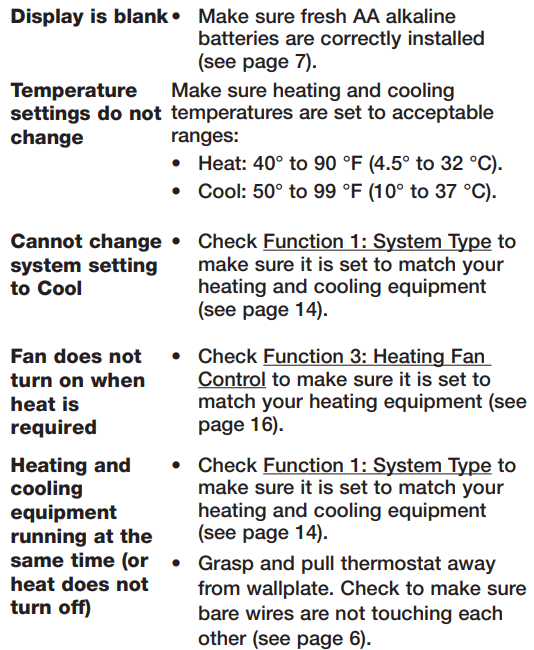
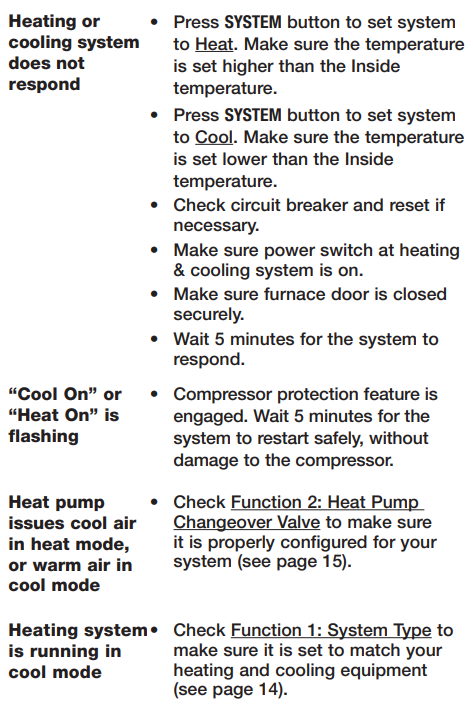
FOR MORE MANUALS BY Honeywell, VISIT MANUALSLIBRARYY
Honeywell RTH6350 5-2 Programmable Thermostat-FAQs
What are common problems with a Honeywell thermostat?
Common issues include the unit not responding, blank display due to dead batteries, inaccurate temperature readings, or miscommunication with the HVAC system.
How do I manually operate the Honeywell RTH6350?
Press the up or down arrow buttons to set your preferred temperature. The setting will remain until you change it or the programmed schedule resumes.
Why does my thermostat show the wrong temperature?
This can happen due to dust buildup, poor placement near heat sources, or a faulty sensor. Cleaning or repositioning the thermostat usually helps.
How do I know if my thermostat is working correctly?
If the screen is responsive, the HVAC system turns on/off as scheduled, and the room temperature matches the thermostat reading within 2–3 degrees, it’s functioning properly.
What is the recommended temperature setting for comfort and savings?
Set it around 68°F in winter when at home and lower at night, and about 78°F in summer for cooling, adjusting slightly for comfort and efficiency.
What does the C-wire mean in a thermostat?
The C-wire, or common wire, provides continuous power to the thermostat. It’s often required for modern programmable and smart thermostats.
How often should I change the thermostat batteries?
It’s best to replace the batteries once a year. When the low-battery warning appears, change them immediately to avoid losing your programmed settings.
How do I reset my Honeywell thermostat?
Remove the batteries for about 5 minutes or press the reset button (if available), then reinstall fresh batteries to restart the system.

